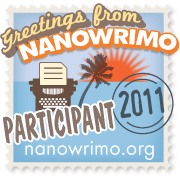Christine Klocek-Lim's Blog, page 18
February 14, 2012
Ballroom — a love story
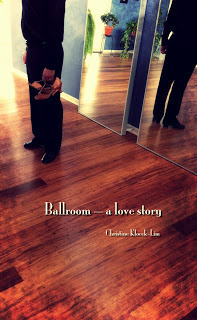
In honor of Valentine's Day, I'm posting one of the poems from my new chapbook, Ballroom — a love story, forthcoming from Flutter Press.
Tango — torneo cinco
My mother finds me in the kitchen
with ice and bandages, foot propped
like a broken shoe.
My bruise looks like Argentina,
a forest of color.
We're learning the tango, I say,
thinking of the trees outside
the dance studio. Oaks along the river.
My mother is thinking, how terrible
the leaves die each winter.
Sometimes love necessitates disaster.
She didn't see his face when we came together.
How I dared him to fall as I stepped around him.
How he dared me to lead, fingers on my body
tight as a locked door. I took five steps,
unaware of the vertigo. The difficulty of toes
and muscle aligning. It's easier to walk alone
but not as beautiful, I thought, then lost
my way. The forest is a trickster.
Doesn't it hurt? she wonders, fingering my instep.
I bandage the pain and pull away.
No explanation.
I'm remembering the trees, how the leaves
turned scarlet at just the right moment.
His palm, perilously sweet
against my wound.
© 2012 Christine Klocek-Lim
Published on February 14, 2012 06:19
January 24, 2012
my review of Voices Through Skin
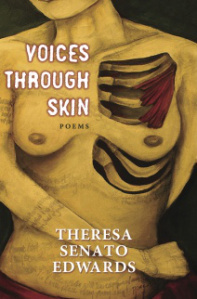 ISBN: 978-0-983-29310-1
ISBN: 978-0-983-29310-1$14.95
NOW AVAILABLE FROM SIBLING RIVARLY PRESS
Buy from the SRP Bookshop
Buy from Amazon Buy from Small Press Distribution
I first read Voices Through Skin by Theresa Senato Edwards early last year. I'd previously published some poems from this manuscript in Autumn Sky Poetry , so I knew what to expect when I first opened the pages. Imperfection. Difficulty. I said as much in the blurb I wrote for the back cover. What I didn't explain was the sense of vulnerability that permeates so many of the poems. Life is often frightening and difficult. Body and mind are inexplicably linked while navigating tragedy. The book illustrates this duality in its two sections: mind and body.
"The Smell of Alcohol" is a poem in the second part of the book, the 'body' section. It opens with imagery that places the speaker firmly in the hospital: the message tube used by the nurses is akin to "a clear snake ready to attack" and the reader immediately knows this is no comfortable poem. The speaker is afraid. We know this because the poem tells us that the child the speaker cares for is afraid. This fear bleeds into every description, every image the woman has of her daughter in the throes of illness. The poem ends on a deceptively light note. The girl is nearly grown. The mother is pleased her daughter doesn't remember the hospital. The girl places "her long, strong fingers" on the mother's hand in a strange reversal of care-giving. The mother hides the fear that still lurks in her mind, in the remembrance of alcohol. They say smell is the strongest memory trigger.
I came away from this poem remembering that smell from when my own child was in the NICU. It's a strange thing to fear years after it's all over. The imagery of the poem highlights this fear extremely well with its focus on blood and fever and alcohol. The poem is set within the 'body' of the book, but every time I read it I am forced into memory. The main focus of the poem for me is the very end, when the speaker is lost to the memory of her daughter's illness. Body is tied to the mind. It will always be tied thus.
In the first part of the book, the 'mind' section, the poem "Battered" is terribly visceral. The imagery is extremely physical for a poem set in the 'mind.' The speaker's body is vandalized. The speaker exlains this in great detail, using such words as "rammed" and "forced." Strangely, the poem's opening belies the reality: "No man who shared his sex with me / broke me." One would think this is a mantra, proof of un-brokenness, but I found it not so. The poem is almost unbearably tragic. For really, what rape is a sharing? The poem tricks the reader into hope at the beginning only to take it away. The poem ends with this: "I remember being 26." This is a tragedy. The speaker begins with the mind then shows how the brutalization of the body betrays the mind. Memory is all the speaker has left and it torments her. She remembers being whole. Being young in mind, as she no longer is.
The rest of the poems in the book are similarly heartbreaking. Frightening, at least to me. "Your Attempt" in the 'mind' section begins "I'm sorry I wasn't there to stop you." "Her Rituals" details the difficulty of OCD, a common theme in several poems. "Inventing Dead" ends with "Absence is hard, comes without granting. / I make my voiceless appeal."
In the 'body' section the poem "Walls" ends with this idea: "I promised myself I would learn karate, find a new home in the spring." This poem haunts me. One doesn't need promises or karate unless one is a captive. This is an oddly metaphysical idea for a poem that's set in the body. "After Surgery" details the burden of "the throbbing of flesh gone." Of course, it's the mental difficulty of surgery that seems worse in that poem, providing the reader with yet more evidence of the marriage of mind and body.
Some of the poems are written in third person, clearly with a less personal narrator. Some are so achingly personal I felt the furtive embarrassment that comes from reading someone's diary, yet I could not stop reading because as I said in my blurb on the back cover, each poem illustrates the way suffering makes us human. The scars anchor us to the world. I wouldn't accuse this collection of poems as being easy. They're not. They're not comfortable.
They're worth reading anyway.
The scars one carries in life are proof that one has lived and survived. Both the mind and the body carry these scars. The poems document this in a way that the reader can't ignore. Voices Through Skin is a kind of celebration. An inscription. A testament. This collection pays tribute to what so many quiet, courageous people have discovered through suffering and despite inevitable death: life is worth something. Worth everything.
Published on January 24, 2012 15:15
January 3, 2012
my review of Dark And Like A Web

Dark And Like A Web by Nic Sebastian
download free
- PDF (170kb)
- EPUB (most e-readers)
- MOBI (Kindle)
- MP3 (13mb/14min)
purchase
- print edition
- CD
Last April, as I wrote a set of poems for NaPoWriMo, I also read a set of poems by Nic Sebastian. She called them "prayers and charms" and I eagerly clicked over to the website she'd set up for them each day. I didn't want to miss any. My life was growing more hectic and difficult as the year progressed; her poems calmed me down. They helped me think about the deep spaces of the mind and heart and soul and how my internal landscape informs my dreams and wishes. Back in April 2011 I had no idea how much more insane my year was going to become.
Nic published this collection of NaPo poems later in the year, calling it "Dark And Like A Web" after a quote by Rainer Maria Rilke. She set up a website that offered online access to the poems as well as recordings of her beautiful voice speaking them with depth and emotion. I couldn't help but wonder if she knew how these poems would help me get through my year. Every time some disaster occurred (death, earthquake, hurricaine, blizzard) I invariably picked up her chapbook and read one of the poems. They aren't all peaceful.
In "there are howling wolves" the narrator explains how "their voices tesselate" the night." How "we vibrate." It isn't a comfortable sensation. As the short poem progresses, the reader stumbles over "shattered constellations" and "pieces / of this night." There is no comfort to this poem, except that very discomfort creates a sort of truth that comforted me. At the very end of the poem, the speaker talks of how "we are not coming" and "never were." People don't always figure it out. After an unexpected death in my family this past summer, I felt comforted by this truth. The poem is completely surreal, but the core of it is emotionally real.
Other poems in the chapbook resonate similarly. In August I went on vacation with my family to Washington, DC. While we stood on the National Mall, an earthquake confused our day. People wandered everywhere while random sirens pierced the streets. Two days later we were in Ocean City, Maryland, trying to finish our vacation on the beach. Hurricaine Irene dismantled those plans and we were evacuated along with thousands of others. Cars packed the roads and I read Nic's poem "containing prayer beads and Bangkok."
This poem is set in Bangkok and Seattle but really the cities don't matter. It's the internal landscape of the poem that accompanied me on my journey. I wanted what the speaker of the poem wanted: peace. Love. But, "he tells me to find / my own mantra." The poem speaks a list of exotic places and fills them with gorgeous imagery: "black hair / kicking in the wind" and "gold-shot pain / of sunset." The beauty is always accompanied with an active rushing away from peace. The end of the poem renders the speaker mute. That is what disaster does to a person. Once again, I was strangely comforted. This chapbook was the friend who lived across the country from me. The friend I couldn't talk to very often. The friend who nevertheless understood exactly what I had been feeling in the midst of destruction.
Last year I promised Nic a review of this chapbook. I could go on about the imagery of the poems, their beautiful lines and surreal verbs. How they spoke to me even when I thought I couldn't go on because the earth was covered with snow and a lack of water. Or how the characters in the poems let me dream about places I wanted to go: mountains and rivers and temples. Ultimately, I can't really review this collection of poems, can't say: "oh, I give it three stars or five or seven." Because this particular chapbook of poems carried me like a boat over the drama of my emotions this past year. I can't help but love them. As the opening poem of the book states: "I think you are / a small flame embedded / in silence." Thank you Nic, for giving voice to that flame and letting it light my way for those difficult months. Thank you for that gift.
Published on January 03, 2012 08:45
December 24, 2011
12 days of Catmas
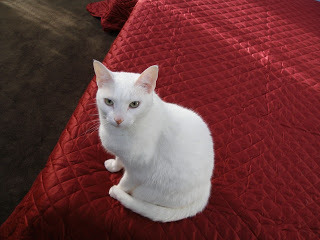
12 days of CatmasOn the first day of Christmasmy two cats gave to mea dingleberry in a pine tree.On the second day of Christmasmy two cats gave to metwo hair balls,and a dingleberry in a pine tree.On the third day of Christmasmy two cats gave to methree dead mice,two hair balls,and a dingleberry in a pine tree.On the fourth day of Christmasmy two cats gave to mefour pathetic howls,three dead mice,two hair balls,and a dingleberry in a pine tree.On the fifth day of Christmasmy two cats gave to mefive piles of poo,four pathetic howls,three dead mice,two hair balls,and a dingleberry in a pine tree.On the sixth day of Christmasmy two cats gave to mesix stinging scratches,five piles of poo,four pathetic howls,three dead mice,two hair balls,and a dingleberry in a pine tree.On the seventh day of Christmasmy two cats gave to meseven shredded sparrows,six stinging scratches,five piles of poo,four pathetic howls,three dead mice,two hair balls,and a dingleberry in a pine tree.On the eighth day of Christmasmy two cats gave to meeight hissy fits,seven shredded sparrows,six stinging scratches,five piles of poo,four pathetic howls,three dead mice,two hair balls,and a dingleberry in a pine tree.On the ninth day of Christmasmy two cats gave to menine fishy farts,eight hissy fits,seven shredded sparrows,six stinging scratches,five piles of poo,four pathetic howls,three dead mice,two hair balls,and a dingleberry in a pine tree.On the tenth day of Christmasmy two cats gave to meten tons of fur,nine fishy farts,eight hissy fits,seven shredded sparrows,six stinging scratches,five piles of poo,four pathetic howls,three dead mice,two hair balls,and a dingleberry in a pine tree.On the eleventh day of Christmasmy two cats gave to meeleven spitting kittens,ten tons of fur,nine fishy farts,eight hissy fits,seven shredded sparrows,six stinging scratches,five piles of poo,four pathetic howls,three dead mice,two hair balls,and a dingleberry in a pine tree.On the twelfth day of Christmasmy two cats gave to metwelve stolen salmon,eleven spitting kittens,ten tons of fur,nine fishy farts,eight hissy fits,seven shredded sparrows,six stinging scratches,five piles of poo,four pathetic howls,three dead mice,two hair balls,and a dingleberry in a pine tree.
Published on December 24, 2011 09:46
December 13, 2011
Pushcart Nomination for Coventina
My poem Coventina has been nominated for a Pushcart. I'm delighted. Thrilled. And really, really late posting about it. I received the email from O.P.W. Fredericks, the editor of The Lives You Touch Publications nine days ago. This particular poem is very near and dear to my heart and I'm so happy people are enjoying it.
Why didn't I post about it sooner? I've been a little busy. In the last few weeks, I've battled a leaky roof, dance rehearsals, a recital squeezed into the smallest stage I've ever seen, sick kids, field trips, shopping, xmas lights and tree decorating, huge dead tree removal, moving a kid to a new room, moving furniture to another room, parties, cooking, painting various parts of the house, cleaning, and etc. I could go on ad nauseum about the craziness that is my life this year but it's actually kind of unbelievable. I think it will all calm down by January 17, 2012. That's going to be the awesomest Tuesday EVER.
Why didn't I post about it sooner? I've been a little busy. In the last few weeks, I've battled a leaky roof, dance rehearsals, a recital squeezed into the smallest stage I've ever seen, sick kids, field trips, shopping, xmas lights and tree decorating, huge dead tree removal, moving a kid to a new room, moving furniture to another room, parties, cooking, painting various parts of the house, cleaning, and etc. I could go on ad nauseum about the craziness that is my life this year but it's actually kind of unbelievable. I think it will all calm down by January 17, 2012. That's going to be the awesomest Tuesday EVER.
Published on December 13, 2011 16:47
November 9, 2011
Knight in Black Leather by Gail Dayton
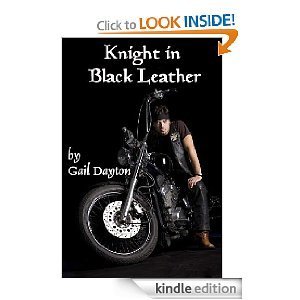
Romance novels are awesome. Read the following two sentences and tell me you're not jealous you didn't write them:
"The woman didn't belong. She was as out of place in the dark winter streets of this part of Pittsburgh as a poodle in a jungle."
Those gorgeous sentences are from a new book just out now on Kindle by Gail Dayton: Knight in Black Leather. Notice how the entire novel begins with a negative. "I thought we weren't supposed to do that?" all the writing students will be thinking. Yeah, no. Please ignore that old high school English teacher advice. The second sentence gives us a little more information: the speaker is watching a woman, not with a vaguely disapproving attitude, but with curiosity. Just as the reader begins to think, "Hmm, interesting," Dayton cuts loose with one of the most creative metaphors I've ever read. IN THE SECOND SENTENCE OF THE BOOK. And we've got location, time of day, and the season to boot. At first, I was jealous. I want to write like that. I REALLY want to write like that. Happily, my jealousy didn't last long, mostly because those sentences are so intriguing that I couldn't stop reading long enough to savor my envy. It faded away as quickly as an ice cube taped to a poodle's butt.
When reading a romance novel, one jumps into the thing with a single, solid certainty: the book will always have a happy ending. This book doesn't disappoint with that, of course, but the journey toward that ending is so freaking awesome that I stopped thinking about it halfway through the first chapter. Another staple of the romance genre is the role of hero and heroine. My biggest pet peeve with romances is when these characters are stupid and fight all through the book about dumb things. A great many writers do this to create tension but it's really just lazy writing, in my opinion. This novel does not fall prey to that problem. Eli, the hero, is one of the most likable characters I've read. He always keeps his promises. The heroine, Marilyn, is also incredibly decent. Neither of them fight over stupid things. Instead of fake tension created by fake problems, every single one of the plot points in this book arises out of who these two people are, how they got to be where they are in their lives, and how those experiences (both painful and joyful) cause them to react to each other in the midst of the larger plot. The sheer brilliance of the writing of these two characters makes me utterly grateful that Gail Dayton is alive and can type and apparently plans to continue for the forceable future at those tasks.
Eli and Marilyn felt real to me as I read their story. Neither was perfect yet neither was so completely a caricature of brokenness that I grew exasperated. I adored the way they met and how they grew to know each other. I would've been perfectly content reading about their love story, except the book managed to introduce supporting characters that were just as real as Eli and Marilyn. Marilyn's family, and the characters close to Eli were just as well put together. And then, as I settled into the book, thinking "oh, I know where this is going," the plot intensified. Things happened that I just did NOT expect. And the characters STILL didn't panic and do dumb things that made no sense. I don't want to give anything away, so I've left the particulars rather vague in this review. Suffice to say, I laughed out loud during the first chapter. I sighed in happiness by the seventh and bit my lip in dismay by the twenty-third (I also might have cried a little, but I refuse to get into that).
On Twitter, Ms. Dayton said both her agent and her editors loved the novel, but that it "didn't quite fit anywhere." This astonishes me, especially now that I've finished reading it. Truly, if a well-published author can't get a book this phenomenal published, I don't know what that says about the state of the book industry. Bad things, I suppose. The novel, "Knight in Black Leather," is now at the top of my list of books I adore and will read again over and over. Thank you Ms. Dayton for writing this book. Thank you. I loved it.
(Disclaimer: I do not personally know Gail Dayton. I've never met her. And yes, I think all of her books are awesome. My personal favorites are "The Compass Rose," "The Barbed Rose," "The Eternal Rose," "New Blood," and "Heart's Blood.")
Published on November 09, 2011 13:21
November 6, 2011
Autumn Sky Poetry 23, the Art issue, now live

Greetings!
The twenty-third issue of Autumn Sky Poetry, the Art issue, is now online.
Read poems and enjoy art by Mary Alexandra Agner & Julia Tenney, Jesse Anger & Adamo Sacchetti, Catherine Chandler, Noelle Leslie dela Cruz, Luke Evans, Jen Karetnick & Jaime Ferreyros, Jean L. Kreiling, Mary Meriam, Richard Meyer, John Savoie & Shannon E. Thomas, Joannie Stangeland, and Laura Elizabeth Woollett.
With this issue, Autumn Sky Poetry is going on an indefinite hiatus. I'm grateful, as always, that so many talented artists and poets have graciously allowed me to publish their work over these past six years. Thank you for making Autumn Sky Poetry one of the more enduring poetic experiences of my writing life.
—It's all about the poetry.
Sincerely,Christine Klocek-Lim, Editor
Published on November 06, 2011 17:47
November 3, 2011
NaNoWriMo has begun
Published on November 03, 2011 17:34
October 7, 2011
Editor's Choice: The Voice of Christine Klocek-Lim
I'm happy to say that three poems of mine (Coventina, Jeremiel, and Phoenix) have been selected as the Editor's Choice in the September 2011 issue of Touch: The Journal of Healing. I am so very honored and delighted to have been selected, especially because this issue is dedicated to my friend Larina's son. And too, I was incredibly moved by the way in which the editor of the journal, O.P.W. Fredericks, described my work. Here is an excerpt:
"What I appreciate most about Christine's poetry is the eloquence with which she conveys the moments about which she writes. The movement of her poetry from moment to moment seems effortless; her imagery is clear and concise; her adherence to form, technique, and poetic diction is sound; her grounding in place is solid; and there is an immediacy to Christine's poetry that is often realized in the first line. The subjects in her work are always treated with sensitivity and honesty, and there is a lilting quality to her words even when they describe turmoil and heartache."
Thank you Touch: The Journal of Healing . Thank you O.P.W and Daniel, editors extraordinaire.
"What I appreciate most about Christine's poetry is the eloquence with which she conveys the moments about which she writes. The movement of her poetry from moment to moment seems effortless; her imagery is clear and concise; her adherence to form, technique, and poetic diction is sound; her grounding in place is solid; and there is an immediacy to Christine's poetry that is often realized in the first line. The subjects in her work are always treated with sensitivity and honesty, and there is a lilting quality to her words even when they describe turmoil and heartache."
Thank you Touch: The Journal of Healing . Thank you O.P.W and Daniel, editors extraordinaire.
Published on October 07, 2011 06:28
September 5, 2011
It's September
but the summer of hell continues. A dear friend of mine lost his mother yesterday. That makes three deaths this summer for people close to me. I'm not really feeling the urge to write or blog or whatever. Two more people close to me are ill. And my house is possessed by demons if the way pieces of it (including things inside) keep breaking is any indication.
With that, I leave you with a poem by Coleridge that feels strangely appropriate, via Poets.org:
Work Without Hope
Coleridge is the author of the first poem I ever memorized so I have a special fondness for his work. If only I could be reciting Kubla Khan and reveling in that pleasure dome, but alas, I think that might actually require psychotropic drugs, of which I have none. I have only my tea and the view from my office window. Yesterday a hummingbird dive bombed a monarch butterfly. It was awesome. I also have my kids who continue to amuse me. Today my 14 year old emailed me this video: Yeah, toast (warning: video game violence). So funny!
With that, I leave you with a poem by Coleridge that feels strangely appropriate, via Poets.org:
Work Without Hope
Coleridge is the author of the first poem I ever memorized so I have a special fondness for his work. If only I could be reciting Kubla Khan and reveling in that pleasure dome, but alas, I think that might actually require psychotropic drugs, of which I have none. I have only my tea and the view from my office window. Yesterday a hummingbird dive bombed a monarch butterfly. It was awesome. I also have my kids who continue to amuse me. Today my 14 year old emailed me this video: Yeah, toast (warning: video game violence). So funny!
Published on September 05, 2011 08:25

